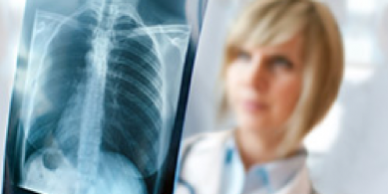One of the most common killers of the elderly, pneumonia is most likely to be picked up when you’re just getting over another illness like the cold or flu.
Just when you think you’ve turned a corner and are feeling better, you develop an infection in your lungs. Its arrival makes sense. When you’re sick, your lungs are weak and can’t fight off infection.
People with chronic diseases like cancer, diabetes, asthma, or heart disease are also prone to getting pneumonia. And while a healthy adult can recover in a few weeks, babies, the elderly, and those with impaired immune systems can be in serious danger when pneumonia sets in.
Making it more difficult to avoid is the fact that pneumonia comes in so many forms. It can be caused by bacteria (most common), a viral infection, a fungus, or parasite. Symptoms and treatment vary depending on the cause, so knowing what you’re dealing with will provide the best possible outcome.
Pass It Along
You can get pneumonia from breathing infected air; breathing in bacteria from your nose or throat; or from a cold, flu, or other viral infection. Some people even develop an infection in their lungs after they’ve breathed in food, stomach acids, or vomit. Germs that can cause pneumonia can be found at school, at the office, at the store, and beyond. Pneumonia can also be picked up at a healthcare facility. Treatment may differ depending on where you contracted the infection.
Recognize It
The lungs are filled with small sacs (alveoli) that fill with air when you breathe. With a lung infection like pneumonia, the sacs fill with mucus and fluid, making it difficult to breathe.
A bacterial infection usually comes on fast. Symptoms include a cough that produces mucus (may be blood-tinged), fever, chills, shortness of breath, a racing pulse, chest pain from coughing, fatigue, vomiting, or diarrhea. Elderly folks with pneumonia often exhibit confusion or delirium. These symptoms can range from mild to severe.
When pneumonia is caused by a virus, fungus, or parasite, symptoms usually appear slowly and not as severe. Many people may not realize they have pneumonia. Symptoms include fever, a cough that doesn’t produce much mucus, and shortness of breath.
The severity and duration of your illness will depend on your age, health, cause of illness, and how quickly you receive treatment. A mild case may clear up in several weeks, while older adults may take a couple months to recover.
Who’s At Risk?
Yes, anyone can suffer from pneumonia—especially as it spreads with such ease through the air. However, certain groups of people are more likely to contract the disease. These include those who smoke, have a lung disease like asthma, are younger than a year or over the age of 65, have recently had a upper respiratory infection, have a weak immune system, or who take medication to reduce stomach acid.
Take Care
The sooner you receive treatment for pneumonia, the faster you’ll recover. See your doctor as soon as possible if you experience the symptoms listed above, and seek emergency medical attention if you have trouble breathing, intense chest pain, cough up a lot of blood, or feel faint.
Following a physical exam, your doctor may order a chest X-ray and a complete blood count to diagnose pneumonia and begin appropriate treatment. Antibiotics are the best treatment for a bacterial infection, but they won’t treat a virus. In that instance, the illness just has to run its course. If you’re susceptible to pneumonia after an illness like the flu, antiviral medications may help.
Arm’s Length
Frightening as pneumonia is, you can lessen your chances of developing the disease. If you smoke, quit. Also, stay away from people who have pneumonia, colds, or the flu and who are still contagious, and wash your hands frequently to avoid germs.
Have kids?
Be sure to get them the pneumococcal conjugate vaccine. This will prevent complications should they ever have pneumonia. Other vaccines such as the flu, measles, and chickenpox vaccines also help prevent diseases that can lead to pneumonia.







